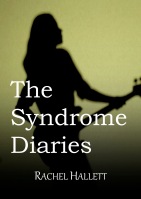How to write a novel: 1 The Idea
Perhaps that should be ‘How I write a novel.’ The Syndrome Diaries has been two years in the making, from the first germ of the idea to the edited, polished, proofed and re-proofed manuscript that will soon be going onto Amazon. I thought I’d blog about the process I’ve been through to get it from the ‘aha!’ moment to the finished novel.
 The central plot for the novel came to me very quickly while I was out for a run in summer 2010. It started with a question: were there circumstances in which adulterous behaviour might be OK?
The central plot for the novel came to me very quickly while I was out for a run in summer 2010. It started with a question: were there circumstances in which adulterous behaviour might be OK?
You probably have an answer to that in your head right now, and I found myself in a very heated discussion on morals and motivations after reading out an extract at my writers’ group. But the question on its own isn’t much of a plot. I had to create the circumstances around the temptation to stray, and that led me to introduce a third main character. As my ideas grew shoots and leaves, this third character decided she wanted a starring role, and she pretty much got it – or rather, her diaries did.
So where did all this come from? I have never committed adultery and neither, to my knowledge, has my husband or anyone else I’ve been in a long-term relationship with. It might have been from the many newspaper articles giving statistics on staying faithful. Perhaps it’s simply an age-old human dilemma that most of us hope we’ll never have to deal with.
If you asked me how I got my ideas, I wouldn’t be able to tell you. What I do know is that they come suddenly and they grow rapidly, branching out in sub-plots and detail that I have to start taming into a plan before I can start to write – and that’s the subject of my next blog.
Do you have a method for generating ideas? Or do you have to wait for the muse to strike?

It all starts with a question, doesn’t it?
I don’t really have a method. Something just sprouts, and I spend a good deal time trying to tease it open and expand it until I think I can pull a story from it.
Good luck!
I wish I could find a method! But like you, something just sprouts and I don’t seem to have much say on when.
For me, ideas spring about in the same way. Usually I’m focused on something else other than consciously trying to think of stories. Working out, playing my guitar, cleaning dishes…
I’m not sure whether I’m thinking about what I might write for the next novel or not when the ideas strike. Maybe its an unconscious thing – it’s going on in my head, but I’m not aware until it suddenly pops into my consciousness.
Hopefully it is okay to join your discussion. Thank you for being open about your experiences with the novel. I admire you for pressing through each of the roadblocks life places at our feet.
To answer your question. I have an idea and sometimes a way to solve it. I allow that to rattle in my head for a time until somehow the right answer finally pops out. In my novel (still in progress) I knew the begining, a middle and the end before I started writing. It has been quite a journey to fil in the blanks. And quite fun as well.
Cheers.
Hi Robakers – you’re more than welcome to join the discussion. It sounds like your process is quite a conscious one and yes, filling in the blanks is definitely the fun bit.
No method here! My muse strikes whenever she fancies–however I have to be alert and open to her suggestions. Sometimes, if I don’t bounce on her ideas they get lost in the shuffle of Life and I forget them! Definitely an unbidden moment, so I try to be aware that anything could become a story idea.
I think it was Ray Bradbury who said something like, if you fill yourself up with good books, art, music, friends, life, experiences, movies, plays, etc., etc., you’ll never have a dry spell in your life. I heartily take his advice as often as possible, and I’ve never been dry of ideas.
I keep saying I’ll write a novel one day though I think it may be more travel writings in the end. Very best of luck with yours 🙂
Writing doesn’t just happen; it’s hard work, like every other occupation – and that means, sometimes, bludgeoning your way through the page, dragging those ideas out, kicking and screaming. This is true for non-fiction (which I mostly write and publish) as well as for fiction.